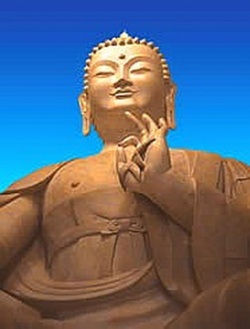Manual of Madhyamika - Reading Two: The Benefits of the Wish for Enlightenment
The following reading is taken from the Entry Point for Children of the Victorious Buddhas (rGyal-sras ‘jug-ngogs), a commentary by Gyaltsab Je Darma Rinchen (1364-1432) on the book called Guide to the Bodhisattva’s Way of Life (Byang-chubsems-dpa’i spyod-pa la ‘jug-pa) by Master Shantideva (c. 700 AD).
The second part [the more detailed contemplation upon the benefits of the wish for enlightenment) has four divisions: an explanation of the benefits of the wish for enlightenment, identifying just what the wish for enlightenment is, a presentation of the reasons why these benefits occur with the wish, and words in praise of persons who are practicing the wish.
The first of these divisions has three sections of its own: a description of how the wish has the power to destroy all bad deeds and to accomplish all good deeds; how those who achieve the wish attain both an exceptional name, as well as the point of the name; and metaphors which are used to explain the benefits.
The first of these sections has three of its own: how the wish has the power to destroy great bad deeds; how it has the power to accomplish the highest form of happiness; and how it has the power to bring about anything you might ever wish for.
What kind of goodness could there ever be
Other than the wish for total enlightenment
That could overwhelm those negative deeds
Of dreadful and awesome strength?
Making great efforts to practice the two forms of the wish for enlightenment is something which is very right to do. This is because we have committed negative deeds of dreadful strength, deeds that would cause us to be born into the hells, or the like. And what kind of goodness could there ever be, other than the wish for total enlightenment, that could overwhelm them? The answer is that there is no such other goodness.
The main point being mentioned here is not the fact that the ultimate form of the wish has the power to eliminate the seeds for spiritual obstacles. The intent rather is to indicate the benefit of the wish where, in its “deceptive” form, the wish functions to clear away those causes already created which would take one to the births of misery, and also functions to prevent the continued creation of these causes in the future.
The Lords among Victors contemplated the question
For many millions of years and saw
That this alone could be of benefit.
Again we can say that making efforts to practice the wish is something which is very right to do. This is because the Lords among Victors have considered and contemplated, for many “countless” periods of millions of years each, the question of what could be of benefit to, or a way to achieve the ends of, all living beings.
And what they saw was that this wish for enlightenment alone would be so.
It is this wish which allows a limitless
Mass of sentient kind to attain
The highest form of happiness, with ease.
It is this wish for enlightenment which is like a special seed, one that has the power which allows a limitless number of living beings, a great mass of sentient kind, to attain the highest form of happiness. And it allows them to do so with ease, with perfect ease—that is, without having to undertake any such difficult spiritual practices as undertaking the life of a cave-dwelling yogi. It’s just as the lines say which go,
What person with any intelligence at all
Would lose heart in going easily to ease?
Those who hope to smash the thousand pains
Of the cycle of life, or to solve
The unhappiness of every living being,
Or bring them to the many thousand forms
Of happiness, must never give up
This very wish for enlightenment.
And we can say once more that it is very right to practice this very wish, for it is the highest means of helping all living things, both oneself and all others. This is because there is no higher method for persons of any level, whether you are one of those who is practicing the attitude of those of medium capacity, and who thus hopes to smash the thousand pains of the cycle of life as they exist within your own being; or whether you are one of those who is practicing the attitude of those of greater capacity—who hopes to solve the unhappiness of absolutely every living being, or to bring them to the many thousand forms of happiness, meaning the happiness of the higher realms and definite good. These persons then must strive to develop this very wish for enlightenment, and never give it up, which is to say, never let it degenerate once one has succeeded in developing it.
Once they’ve succeeded in developing
The wish for enlightenment, then even
Those miserable beings chained in the prison
Of cyclic life are in an instant referred to
By Those Gone to Bliss as their very own
Daughters or sons, and are worthy to be bowed to
By the entire world, of men and gods.
And again we can say that it is a very right thing to make great efforts in developing the wish for enlightenment, for the following reasons. Suppose that any person succeeds in developing the wish for enlightenment, in either the form of a prayer or activity itself. Within the very next instant after doing so they are given an exceptional name, for Those Gone to Bliss then refer to them as their very own daughters or sons. They also attain the point of this name, which is that they become worthy to be bowed to, worthy to have the entire world, of both men and gods, clasp their hands at their breasts and prostrate to them.
And it is not the case that only those great bodhisattvas residing at high levels obtain these benefits, because even those miserable beings chained by their mental afflictions and past deeds in the prison of cyclic life also reap these same benefits in the very next instant after succeeding in developing the wish. Here is the third part, where metaphors are used to explain the benefits of the wish. There are six such metaphors, to express the following: changing the inferior to the supreme; being difficult to find and very precious; giving unending results and continually increasing; being able to protect one from some great fear; smashing bad deeds without any difficulty at all; and finally, being described as beneficial in the sutras.
Keep this thing called the “wish for enlightenment”
As firmly as you can, for like
The highest form of alchemical elixir
It transforms this filthy body you’ve taken
To the holy form of a Victorious One,
Of immeasurable value beyond all value.
Once you have contemplated its benefits, then you are to keep—that is, you must keep—this thing called the “wish for enlightenment” as firmly as you can: find it, and then prevent it from ever lessening. This is because it is like the highest form of alchemical elixir, the kind where you need only a single gram of the elixir to change a thousand grams of iron into gold. And this is so because with the wish, and with it alone, you can transform this filthy body you’ve taken on—a body which is filthy both in the sense of what has brought it about, and from the point of view of the stuff from which it is made—into the holy form of a Victorious One, of immeasurable value beyond all value.
This is an abbreviated presentation of the benefits of the wish explained in the scripture known as Stalks in Array, where it uses the metaphor of that kind of quicksilver known as “goldmaker,” where you can use a single gram of the elixir to transform a thousand grams of iron into gold.
Those who seek to be free of the state
Of living beings should keep, well and firm,
This precious jewel, the wish for enlightenment,
For that single captain of living kind
Has searched at length with a state of mind
Beyond all limit, and found it to be of great value.
Those who seek to be free of the state of living beings—that is, who seek to be free of each and every one of the troubles of this cycle of life—should seek to develop, well, the wish for enlightenment, and then keep it firm, without ever lessening, for it is like the king among the lords of all precious jewels. That single and matchless captain of living kind, the Buddha, is like a master ship captain who guides the merchants of old to the Isle of Jewels. He and all those beings who possess the state of mind beyond all limit—unlimited wisdom—have searched at length, very thoroughly, to find what it is that would be the highest method of clearing away all the poverty of living kind. And they have found that the wish, and only it, is of great value; that is, they have seen that it is a method of great rarity and benefit.
All other good deeds are like the plantain tree,
That gives its fruits and always dies away;
The wish for enlightenment though is an evergreen
That never dies by giving its fruits,
But rather ever increases.
Practicing the wish for enlightenment is moreover a right thing to do for those who hope to see their good deeds never die, but increase ever further. This is because all other good deeds, meaning those that are not imbued by this wish, are like the plantain tree: they give their fruits and, once they have done so, it is always the case that their ability to produce further fruits dies away. The wish for enlightenment though is an evergreen: it is like a wish-giving tree, in that it never dies by giving its fruits, but rather ever increases, higher and higher. As the Sutra Taught by Inexhaustible Understanding states,
A drop of water which falls into the great sea never disappears, even in the period of an eon of millions of years. Virtues which have been dedicated to enlightenment are just the same: they never disappear before the state of perfect enlightenment is achieved.
A person may have committed deeds
That are dreadful in the extreme, and yet
Anyone who relies on this can be freed
From all of them in an instant, as though they relied
On a warrior to save them from some horrible fear.
Why then would those who live with care
Not choose to rely upon this very wish?
For what reason, why, would those who live with care (meaning those who have gladly taken it upon themselves to master the way of life relating to the practice of the wish for enlightenment) not rely upon this very wish? It would be right for them to do so, for the following reason. A person may have committed deeds that are dreadful in the extreme, may have done things to hurt the Three Jewels, or else committed one of the immediate deeds or something similar, and yet they can be freed from all the fears of the lower realms in an instant, if they rely on this wish for enlightenment. This is because it is like relying on a warrior to save oneself from some horrible fear that one might meet with while travelling along some road.
It burns with certainty, in an instant,
Even the greatest of bad deeds, as if it were
The fire that comes at the end of time.
This wish for enlightenment has a tremendous ability to destroy the effects of bad deeds. It is as though this wish were the fire that comes at the end of time, meaning at the end of the eon of destruction—the fire that destroys the entire physical world from the first meditation level on down. This is because the wish can burn, with certainty, and in a single instant, even the greatest of bad deeds: those deeds which would force one into a birth in the hells. If the wish, by the way, has the power to destroy even those kinds of karma which are certain to produce an experience, then there is no need to say that it has the ability to do so with those types of karma which are not certain to produce an experience. Those of the Greater Vehicle can utilize an act of purification, in which all four of the forces of purification are present, in order to purify themselves of the expected ripening of those types of karma which are certain to produce an experience. The expression “certain to produce an experience” then refers to those kinds of karma which are proven, through many cases of scriptural authority and also through reasoning, to be certain to produce an experience unless one practices the appropriate antidote to their power.
The benefits of this wish, beyond all reckoning,
Were spoken to Sudana by the Gentle Protector,
The One who Possesses Wisdom.
The benefits of the wish for enlightenment, as described above, are certain to occur if you succeed in developing it. This is because the benefits of this wish, and its praises, which are beyond all reckoning, really are just as they were spoken to the younger bodhisattva Sudana, in the sutra called Stalks in Array, by the bodhisattva who is the Gentle Protector, the One Who Possesses Wisdom.
This point is explained in great detail in the sutra mentioned on such occasions as where it begins by saying,
Oh son of noble family, this wish for enlightenment is like a seed for each and every quality of an enlightened being. And because it makes all the pure white qualities of every living being grow and increase, it is like a rich field of soil. . .
And continues up to,
. . . It is as well like an excellent [wish-giving] vase, for it fulfills your every wish. And it is, finally, like a spear, in that you can use it to defeat the enemy of anything related to the mental afflictions.
See Also
- Manual of Madhyamika - Reading One: Author, Structure, and History of the Text
- Manual of Madhyamika - Reading Two: The Benefits of the Wish for Enlightenment
- Manual of Madhyamika - Reading Three: How to Make Offerings
- Manual of Madhyamika - Reading Four: The Four Forces of Purification, Part One
- Manual of Madhyamika - Reading Five: The Four Forces of Purification, Part Two
- Manual of Madhyamika - Reading Six: Taking Joy
- Manual of Madhyamika - Reading Seven: How to Fight the Mental Afflictions, Part One
- Manual of Madhyamika - Reading Eight: How to Fight the Mental Afflictions, Part Two
- Manual of Madhyamika - Reading Nine: Awareness
- Manual of Madhyamika - Reading Ten: The Perfections of Giving and Ethical Living



